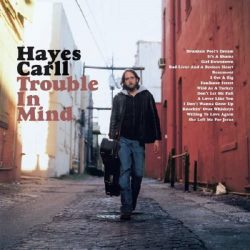 When his third album, ‘Trouble In Mind’ was released in 2008, Hayes Carll was an up and coming yet still relatively unknown alt-country singer-songwriter, who had built up a small, but dedicated, group of fans through years of relentless gigging, mostly in Texas and the neighbouring states – but that was all about to change. Given the subliminal, but almost certainly intentional, stylistic similarities in the album artwork to ‘The Freewheelin’ Bob Dylan’ then you just knew that he had to have something musically special up his sleeve to back it up. Luckily he did.
When his third album, ‘Trouble In Mind’ was released in 2008, Hayes Carll was an up and coming yet still relatively unknown alt-country singer-songwriter, who had built up a small, but dedicated, group of fans through years of relentless gigging, mostly in Texas and the neighbouring states – but that was all about to change. Given the subliminal, but almost certainly intentional, stylistic similarities in the album artwork to ‘The Freewheelin’ Bob Dylan’ then you just knew that he had to have something musically special up his sleeve to back it up. Luckily he did.
Those familiar with Carll’s first two albums, the now hard to find ‘Flowers and Liquor’ from 2002 and his 2005 release ‘Little Rock’ may have expected more of the same, after all, Hayes Carll has always been a great wordsmith and storyteller but on ‘Trouble In Mind’ his music matures. There’s a more rounded approach and complexity to the production but at its heart, it’s still focused on his witty writing, with its deft eye for detail, coupled with an often acerbic wit (which those of you who have seen live will attest to, as he effortlessly entertains his audience with the backstories to many of his songs). There are 14 tracks on the album and Carll penned 12 of them himself with the other two being excellent covers of Tom Waits’ ‘I Don’t Want To Grow Up’ and Scott Nolan’s ‘Bad Liver And A Broken Heart’, with the latter almost serving as a summary for the overall theme of the album.
Kicking off with ‘Drunken Poets Dream’, Carll immediately sets the scene for the type of characters who inhabit his musical world as he puts his somewhat idiosyncratic Texas drawl to god use as he launches into the opening lyrics with “I got a woman, she’s wild as Rome, She likes to lay naked and be gazed upon” before adding to the wonderful seediness with “Honey, don’t worry ’bout Judgement Day. All these people goin’ to heaven, They’re just in our way” before somehow managing to incorporate pistols, mescaline and even a Loius L’Amour paperback into the various cleverly worded verses. The album then quickly changes tack with a slightly reworked version of the concert staple ‘It’s A Shame’ (which had first appeared on ‘Flowers and Liquor’) as he laments a love that might have been before continuing in a similar but more jaunty vein with ‘Girl Downtown’.
If there is one song on the album that garnered Carll wider attention and considerable airplay it has to be ‘She Left Me For Jesus’ and it’s also fair to say that it’s either a love it or hate it song, with the more fundamental evangelicals left enraged with lyrics like “They must think that I’m stupid or I don’t have a clue. I bet he’s a Commie, or even worse yet a Jew” or “Why the last time we made love she even called out his name” and again that distinctive Houston drawl only adds to the weird juxtaposition. Love it or hate it, you have to admire the lyrical dexterity and rapier-like wit that really makes the song a standout.
There’s a host of other great tracks on ‘Trouble In Mind’ and it displays all the linguistic and musical style that Hayes Carll is now rightfully recognised for. The majority of the songs are about people who have to try to face up to the many hardships of life, with the characters often resorting to alcohol to help deaden the pain and while it’s not autobiographical there are certainly elements of Carll’s own life reflected in the stories It’s not all doom and gloom, but it does provide a close look at life in all of its forms – the good, the bad and the downright ugly.
‘Trouble In Mind’ is Hayes Carll’s third album and although it barely made a dent in any charts it paved the way for his fourth album ‘KMAG YOYO’ which made it onto the list of Rolling Stone’s “50 Country Albums Every Rock Fan Should Own” but ‘Trouble in Mind’ is a much better album and a great introduction to his music for those not too familiar with him.



Tremendous talent, wonderful way with lyrics and great live. I’m surprised you didn’t mention Steve Earle’s animus towards him after his wife left him for Hayes.
I did consider mentioning that, but in the end decided against it as I couldn’t really see what it added – other than filling on Hayes personal life. Although Earle’s comment that Alison Moorer left him for a “younger, skinnier, less talented singer-songwriter” was pretty memorable.
You were right. He told us that quite a few of the songs from What it is is about his wife.